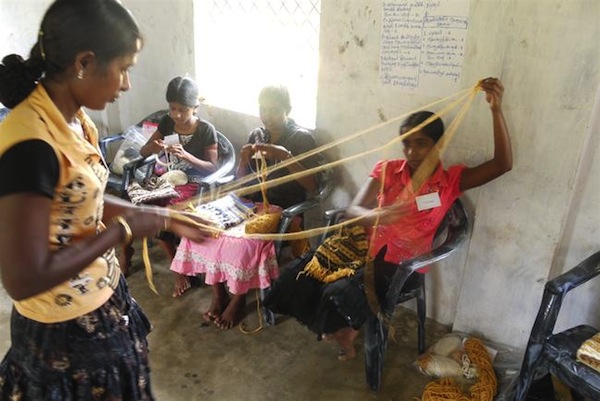Image courtesy Norwegian Embassy, Sri Lanka
First of all, I would like to define sustainable development. According to the Brundtland report it is “a development that meets the needs of the present without compromising the ability of future generations to meet their own needs.”
But it is important to go further in the definition: “Sustainable development has 2 concepts: the first one is the needs, particularly the needs of the poor, to whom priority should be given. The second is the idea that the actual state of technology and social organization impose limitations to the capacity of the environment to satisfy present and future needs.”
This definition is an invitation to think differently. Sri Lanka has to thrive by following this path for a sustainable development, which is taking care of poverty, and economic development while taking into account environmental constraints. Sri Lankan growth rate is high (8%), true story, but if we dig a little further, we can see that the income inequality has been increasing over the years. Sri Lankan Gini index is 42 on a scale of 100, with 100 representing a perfect inequality. Our country is among the most unequal countries of the world. Moreover, 12% of the population is still living below poverty line and the share of the population over 60 will double from 10 to 20 % over the next 25 years; this trend will have an aggregate impact on the economy through labor force participation and health care.
Sustainable development implies to work simultaneously on different objectives, which will take Sri Lanka towards prosperity and peace. It is not about achieving an ideal but it is a process aiming towards constant improvement taking into account the environmental dimension in order for the whole population to benefit from it.
I decided to point out some main challenges for a sustainable economic development in Sri Lanka:
- The challenge for production and consumption thanks to responsible producers and consumers who would take into account life cycles of their products and services.
- The challenge of developing knowledge and information, training, while valorizing research and innovation which are the basis for Sri Lanka’s competitiveness.
- The challenge of climate change and energy, which requires more responsibility in the consumption of those in Sri Lanka who have the chance to be wealthier. The development of sustainable energies, proper land settlements while taking into account vulnerable activities and people.
- The challenge for a sustainable mobility looking for an innovative transportation system, which could satisfy our economical and ecological performances.
- The challenge for biodiversity conservation and sustainable management. Working for a better knowledge of biodiversity and for a better appreciation of its contribution to our most essential needs, on our economy, our urbanization, for an eco-innovative Sri Lanka.
- The challenge of demography and social integration, by fighting against any kind of exclusion, leaning upon the multicultural dimension of Sri Lanka.
- The last but not the least: The challenge for proper governance: I promised myself not to say what it shouldn’t be, as I think we have some good examples…But according to me it should be one that facilitates the adaptation to changes and help Sri Lankan society to develop by taking into account ALL the stakeholders.
Of course these challenges are not easy, Sri Lanka requires a new economy not only Sri Lanka perhaps the whole world. Capitalism and democracy are proved to be the most effective in our world, but it is important to think about which form of capitalism and which type of democratic participation we want for our country?
Whatever this new economy will be, it needs to put investment in the heart of these challenges: Reconceive investments. We are still living in a world where investment is about a mindless and relentless pursuit of consumption growth. We need to invest to nurture and protect the ecological assets on which our future depends. We need to invest in the idea of a simple and meaningful prosperity by providing capabilities for our people to flourish.
The main point I’m trying to make is this. It is up to us to make those changes starting on our own scale, there won’t be a one sized solution, and as one of my teacher said: “We are all learning by doing, but the operative word is doing”.
###
[Thisal Dewundara holds a BBA from ESSEC Business School (Paris) and is currently preparing a Master in Tourism Management at the Centre for Higher Studies on Tourism (IREST/Sorbonne). He also works as a revenue management analyst at the SNCF (French National Railway Corporation).
Thisal participated at the French-Sri Lankan Diaspora Youth Workshop “Post-War Reconciliation Dialogue for a Sustainable Peace”, which took place in Paris, on October 27th, 2012. He participated as a panelist on the theme “Towards an effective and sustainable economic development”.
The event was organized by What’s Next!, an independent forum comprising of post-graduates and young professionals of Sri Lankan origin residing in France. What’s Next! seeks to promote a sustainable peace in Sri Lanka through intellectual exchange and multicultural dialogue.]
